- Home
- Gillian Flynn
Sharp Objects Page 6
Sharp Objects Read online
Page 6
The Crellins. Everyone here was a Crellin but me, I thought childishly.
“I’m sorry you’re sick, Amma,” I said.
“The pattern on the legs is wrong,” Amma whined abruptly. She held the table up to my mother, indignant.
“You’ve got such eyes, Amma,” Adora said, squinting at the miniature. “But it’s barely noticeable, baby. Only you will ever know.” She smoothed back Amma’s damp hairline.
“I can’t have it wrong,” Amma said, glaring at it. “We have to send it back. What’s the point of getting it special-made if it’s not right?”
“Darling, I promise you, you can’t even tell.” My mother patted Amma’s cheek, but she was already standing up.
“You said it would all be perfect. You promised!” Her voice wavered and tears started dripping down her face. “Now it’s ruined. The whole thing is ruined. It’s the dining room—it can’t have a table that doesn’t match. I hate it!”
“Amma…” Alan folded his paper and went to put his arms around her, but she wrenched away.
“This is all I want, it’s all I asked for, and you don’t even care that it’s wrong!” she was screaming through her tears now, a full-blown tantrum, her face mottled in anger.
“Amma, calm yourself,” Alan said coolly, trying to get a hold of her again.
“It’s all I want!” Amma yelped, and smashed the table on the floor, where it cracked into five shards. She hit it until it was in pieces, then buried her face in the sofa cushion and wailed.
“Well,” my mother said. “Looks like we’ll have to get a new one now.”
I retreated to my room, away from that horrible little girl, who was not like Marian at all. My body was heading into a flare. I paced a bit, tried to remember how to breathe right, how to calm my skin. But it blared at me. Sometimes my scars have a mind of their own.
I am a cutter, you see. Also a snipper, a slicer, a carver, a jabber. I am a very special case. I have a purpose. My skin, you see, screams. It’s covered with words—cook, cupcake, kitty, curls—as if a knife-wielding first-grader learned to write on my flesh. I sometimes, but only sometimes, laugh. Getting out of the bath and seeing, out of the corner of my eye, down the side of a leg: baby-doll. Pulling on a sweater and, in a flash of my wrist: harmful. Why these words? Thousands of hours of therapy have yielded a few ideas from the good doctors. They are often feminine, in a Dick and Jane, pink vs. puppy dog tails sort of way. Or they’re flat-out negative. Number of synonyms for anxious carved in my skin: eleven. The one thing I know for sure is that at the time, it was crucial to see these letters on me, and not just see them, but feel them. Burning on my left hip: petticoat.
And near it, my first word, slashed on an anxious summer day at age thirteen: wicked. I woke up that morning, hot and bored, worried about the hours ahead. How do you keep safe when your whole day is as wide and empty as the sky? Anything could happen. I remember feeling that word, heavy and slightly sticky across my pubic bone. My mother’s steak knife. Cutting like a child along red imaginary lines. Cleaning myself. Digging in deeper. Cleaning myself. Pouring bleach over the knife and sneaking through the kitchen to return it. Wicked. Relief. The rest of the day, I spent ministering to my wound. Dig into the curves of W with an alcohol-soaked Q-tip. Pet my cheek until the sting went away. Lotion. Bandage. Repeat.
The problem started long before that, of course. Problems always start long before you really, really see them. I was nine and copying, with a thick polka-dotted pencil, the entire Little House on the Prairie series word by word into spiral notebooks with glowing green covers.
I was ten and writing every other word my teacher said on my jeans in blue ballpoint. I washed them, guiltily, secretly, in my bathroom sink with baby shampoo. The words smudged and blurred, left indigo hieroglyphics up and down the pant legs, as if a tiny ink-stained bird had hopped across them.
By eleven, I was compulsively writing down everything anyone said to me in a tiny blue notepad, a mini reporter already. Every phrase had to be captured on paper or it wasn’t real, it slipped away. I’d see the words hanging in midair—Camille, pass the milk—and anxiety coiled up in me as they began to fade, like jet exhaust. Writing them down, though, I had them. No worries that they’d become extinct. I was a lingual conservationist. I was the class freak, a tight, nervous eighth-grader frenziedly copying down phrases (“Mr. Feeney is totally gay,” “Jamie Dobson is ugly,” “They never have chocolate milk”) with a keenness bordering on the religious.
Marian died on my thirteenth birthday. I woke up, padded down the hall to say hello—always the first thing I did—and found her, eyes open, blanket pulled up to her chin. I remember not being that surprised. She’d been dying for as long as I could remember.
That summer, other things happened. I became quite suddenly, unmistakably beautiful. It could have fallen either way. Marian was the confirmed beauty: big blue eyes, tiny nose, perfect pointy chin. My features changed by the day, as if clouds floated above me casting flattering or sickly shadows on my face. But once it was settled—and we all seemed to realize it that summer, the same summer I first found blood speckling my thighs, the same summer I began compulsively, furiously masturbating—I was hooked. I was taken with myself, an incredible flirt in any mirror I could find. Unabashed as a colt. And people loved me. I was no longer the pity case (with, how weird, the dead sister). I was the pretty girl (with, how sad, the dead sister). And so I was popular.
It was that summer, too, that I began the cutting, and was almost as devoted to it as to my newfound loveliness. I adored tending to myself, wiping a shallow red pool of my blood away with a damp washcloth to magically reveal, just above my naval: queasy. Applying alcohol with dabs of a cottonball, wispy shreds sticking to the bloody lines of: perky. I had a dirty streak my senior year, which I later rectified. A few quick cuts and cunt becomes can’t, cock turns into back, clit transforms to a very unlikely cat, the l and i turned into a teetering capital A.
The last word I ever carved into myself, sixteen years after I started: vanish.
Sometimes I can hear the words squabbling at each other across my body. Up on my shoulder, panty calling down to cherry on the inside of my right ankle. On the underside of a big toe, sew uttering muffled threats to baby, just under my left breast. I can quiet them down by thinking of vanish, always hushed and regal, lording over the other words from the safety of the nape of my neck.
Also: At the center of my back, which was too difficult to reach, is a circle of perfect skin the size of a fist.
Over the years I’ve made my own private jokes. You can really read me. Do you want me to spell it out for you? I’ve certainly given myself a life sentence. Funny, right? I can’t stand to look at myself without being completely covered. Someday I may visit a surgeon, see what can be done to smooth me, but now I couldn’t bear the reaction. Instead I drink so I don’t think too much about what I’ve done to my body and so I don’t do any more. Yet most of the time that I’m awake, I want to cut. Not small words either. Equivocate. Inarticulate. Duplicitous. At my hospital back in Illinois they would not approve of this craving.
For those who need a name, there’s a gift basket of medical terms. All I know is that the cutting made me feel safe. It was proof. Thoughts and words, captured where I could see them and track them. The truth, stinging, on my skin, in a freakish shorthand. Tell me you’re going to the doctor, and I’ll want to cut worrisome on my arm. Say you’ve fallen in love and I buzz the outlines of tragic over my breast. I hadn’t necessarily wanted to be cured. But I was out of places to write, slicing myself between my toes—bad, cry—like a junkie looking for one last vein. Vanish did it for me. I’d saved the neck, such a nice prime spot, for one final good cutting. Then I turned myself in. I stayed at the hospital twelve weeks. It’s a special place for people who cut, almost all of them women, most under twenty-five. I went when I was thirty. Just six months out. Delicate times.
Curry came to visit once, brought yello
w roses. They chiseled off all the thorns before he was allowed into the reception room, deposited the shards in plastic containers—Curry said they looked like prescription bottles—which they locked away until the trash pickup came. We sat in the dayroom, all rounded edges and plush couches, and as we talked about the paper and his wife and the latest news in Chicago, I scanned his body for anything sharp. A belt buckle, a safety pin, a watch fob.
“I’m so sorry, my girl,” he said at the end of his visit, and I could tell he meant it because his voice sounded wet.
When he left I was so sick with myself I vomited in the bathroom, and as I was vomiting, I noticed the rubber-covered screws at the back of the toilet. I pried the cap off one and sanded the palm of my hand—I—until orderlies hauled me out, blood splurting from the wound like stigmata.
My roommate killed herself later that week. Not by cutting, which was, of course, the irony. She swallowed a bottle of Windex a janitor left out. She was sixteen, a former cheerleader who cut herself above the thigh so no one would notice. Her parents glared at me when they came to pick up her things.
They always call depression the blues, but I would have been happy to waken to a periwinkle outlook. Depression to me is urine yellow. Washed out, exhausted miles of weak piss.
The nurses gave us meds to alleviate our tingling skins. And more meds to soothe our burning brains. We were body searched twice weekly for any sharp objects, and sat in groups together purging ourselves, theoretically, of anger and self-hatred. We learned not to turn on ourselves. We learned to blame. After a month of good behavior, we earned silky baths and massages. We were taught the goodness of touch.
My only other visitor was my mother, who I hadn’t seen in half a decade. She smelled of purple flowers and wore a jangling charm bracelet I coveted as a child. When we were alone, she talked about the foliage and some new town rule that required Christmas lights be taken down by January 15. When my doctors joined us, she cried and petted and fretted at me. She stroked my hair and wondered why I had done this to myself.
Then, inevitably, came the stories of Marian. She’d already lost one child, you see. It had nearly killed her. Why would the older (though necessarily less beloved) deliberately harm herself? I was so different from her lost girl, who—think of it—would be almost thirty had she lived. Marian embraced life, what she had been spared. Lord, she had soaked up the world—remember, Camille, how she laughed even in the hospital?
I hated to point out to my mother that such was the nature of a bewildered, expiring ten-year-old. Why bother? It’s impossible to compete with the dead. I wished I could stop trying.
Chapter Five
Alan was wearing white pants, the creases like folded paper, and a pale green oxford when I came down to breakfast. He sat alone at the massive mahogany dining-room set, his light shadow glowing in the polished wood. I peeked pointedly at the table legs to see what all the fuss of last night was about. Alan chose not to notice. He was eating milky eggs from a bowl with a teaspoon. When he looked up at me, a rubbery string of yolk swung like spit past his chin.
“Camille. Sit down. What can I have Gayla bring you?” He tinkled the silver bell next to him, and through the swinging kitchen door came Gayla, a former farm girl who ten years ago traded in pigs for daily work cleaning and cooking in my mother’s home. She was my height—tall—but couldn’t have weighed much more than a hundred pounds. The white starched nursing dress she wore as her uniform swayed loosely on her, like a bell.
My mother walked in past her, kissed Alan on the cheek, sat a pear in front of her place on a white cotton napkin.
“Gayla, you remember Camille.”
“Of course I do, Mrs. Crellin,” she said, pointing her vulpine face at me. Smiled with mismatched teeth and cracked, flaky lips. “Hi Camille. I have eggs, toast, fruit?”
“Just coffee please. Cream and sugar.”
“Camille, we picked up food just for you,” my mother said, nibbling on the plump end of the pear. “Have a banana at least.”
“And a banana.” Gayla headed back into the kitchen with a smirk.
“Camille, I must apologize to you for last night,” Alan started. “Amma is going through one of those stages.”
“She’s very clingy,” my mother said. “Mostly in a sweet way, but sometimes she gets a bit out of hand.”
“Or more than a bit,” I said. “That was a serious tantrum for a thirteen-year-old. It was a little scary.” That was the Chicago me coming back—more assured and definitely more mouthy. I was relieved.
“Yes, well, you weren’t exactly placid yourself at that age.” I didn’t know what my mother meant—my cutting, my crying jags over my lost sister, or the overactive sex life I’d embarked on. I decided just to nod.
“Well, I hope she’s okay,” I said with finality, and stood up to leave.
“Please, Camille, sit back down,” said Alan thinly, wiping the corners of his mouth. “Tell us about the Windy City. Spare us a minute.”
“Windy City’s fine. Job’s still good, been getting good feedback.”
“What comprises good feedback?” Alan leaned toward me, hands folded, as if he thought his question quite charming.
“Well, I’ve been doing some more high-profile stories. I’ve covered three murders just since the beginning of the year.”
“And that’s a good thing, Camille?” My mother stopped nibbling. “I will never understand where your penchant for ugliness comes from. Seems like you have enough of that in your life without deliberately seeking it out.” She laughed: a shrill lilt, like a balloon lifted in a gust.
Gayla returned with my coffee and a banana wedged awkwardly in a bowl. As she exited, Amma entered, like two players in a drawing-room farce. She kissed my mother on the cheek, greeted Alan, and sat across from me. Kicked me once under the table and laughed. Oh, was that you?
“I’m sorry you had to see me that way, Camille,” Amma said. “Especially since we don’t really know each other. I’m just going through a stage.” She flashed an overdone smile. “But now we’re reunited. You’re like poor Cinderella, and I’m the evil stepsister. Half sister.”
“There’s not a speck of evil in you, sweetheart,” Alan said.
“But Camille was the first. First is usually best. Now that she’s back, will you love Camille more than me?” asked Amma. She started the question teasingly, but her cheeks were flushed as she waited for my mother to respond.
“No,” Adora said quietly. Gayla set a plate of ham in front of Amma, who poured honey on it in lacy circles.
“Because you love me,” Amma said, between mouthfuls of ham. The sick smell of meat and sweetness wafted over. “I wish I’d be murdered.”
“Amma, don’t say such a thing,” my mother said, blanching. Her fingers fluttered to her eyelashes, then back determinedly down on the table.
“Then I’d never have to worry again. When you die, you become perfect. I’d be like Princess Diana. Everyone loves her now.”
“You are the most popular girl in your whole school, and at home you are adored, Amma. Don’t be greedy.”
Amma kicked me again under the table and smiled emphatically, as if some important matter had been settled. She swung a corner of the garment she was wearing over her shoulder, and I realized what I’d thought was a housedress was a cleverly wrapped blue sheet. My mother noticed, too.
“What in the world are you wearing, Amma?”
“It’s my maiden cloak. I’m going to the forest to play Joan of Arc. The girls will burn me.”
“You’ll do no such thing, darling,” my mother snapped, grabbing the honey from Amma, who was about to soak her ham further. “Two girls your age are dead, and you think you’re going to the forest to play?”
The children in the woods play wild, secret games. The beginning of a poem I once knew by heart.
“Don’t worry, we’ll be fine.” Amma smiled in a cloying exaggeration.
“You’ll stay here.”
; Amma stabbed at her ham and muttered something nasty. My mother turned to me with her head cocked, the diamond on her wedding finger flashing in my eyes like an SOS.
“Now, Camille, can we at least do something pleasant while you’re here?” she asked. “We could have a picnic in the backyard. Or we could take out the convertible, go for a drive, maybe play some golf over in Woodberry. Gayla, bring me some iced tea, please.”
“That all sounds nice. I just need to figure out how much longer I’m here for.”
“Yes, that’d be nice for us to know also. Not that you’re not welcome to stay as long as you want,” she said. “But it would be nice for us to know, so we could make our own plans.”
“Sure.” I took a bite of the banana, which tasted like pale green nothing.
“Or maybe Alan and I can come up there sometime this year. We’ve never really seen Chicago.” My hospital was ninety minutes south of the city. My mother flew into O’Hare and had a taxi drive her. It cost $128, $140 with tip.
“That’d be good, too. We have some great museums. You’d love the lake.”
“I don’t know that I can enjoy any kind of water anymore.”
“Why not?” I already knew.
“After that little girl, little Ann Nash, was left in the creek to drown.” She paused to take a sip of her iced tea. “I knew her, you know.”
Amma whined and began fidgeting in her seat.
“She wasn’t drowned though,” I said, knowing my correction would annoy her. “She was strangled. She just ended up in the creek.”
“And then the Keene girl. I was fond of both of them. Very fond.” She stared away wistfully, and Alan put his hand over hers. Amma stood up, released a little scream the way an excited puppy might suddenly bark, and ran upstairs.
“Poor thing,” my mother said. “She’s having nearly as hard a time as I am.”
“She actually saw the girls every day, so I’m sure she is,” I said peevishly in spite of myself. “How did you know them?”
“Wind Gap, I need not remind you, is a small town. They were sweet, beautiful little girls. Just beautiful.”
“But you didn’t really know them.”
“I did know them. I knew them well.”
“How?”
“Camille, please try not to do this. I’ve just told you that I am upset and unnerved, and instead of being comforting, you attack me.”
“So. You’ve sworn off all bodies of water in the future, then?”
My mother emitted a quick, creaky sound. “You need to shut up now, Camille.” She folded the napkin around the remains of her pear like a swaddling and left the room. Alan followed her with his manic whistling, like an old-time piano player lending drama to a silent movie.
Every tragedy that happens in the world happens to my mother, and this more than anything about her turns my stomach. She worries over people she’s never met who have a spell of bad chance. She cries over news from across the globe. It’s all too much for her, the cruelty of human beings.
She didn’t come out of her room for a year after Marian died. A gorgeous room: canopy bed the size of a ship, vanity table studded with frosted perfume bottles. A floor so glorious it had been photographed by several decorating magazines: Made from pure ivory, cut into squares, it lit up the room from below. That room and its decadent floor had me awestruck, all the more so because it was forbidden to me. Notables like Truman Winslow, the mayor of Wind Gap, paid weekly visits, brought fresh flowers and classic novels. I could glimpse my mother on occasion when the door opened to admit these people. She’d be in bed always, propped up on a snowdrift of pillows, dressed in a series of thin, flowered robes. I never got to go in.
Curry’s deadline for the feature was only two days away, and I had little to report. Sitting in my room, spread formally on my bed with my hands clasped like a corpse, I summed up what I knew, forced it into structure. No one had witnessed the abduction of Ann Nash last August. She’d simply vanished, her body turning up a few miles away in Falls Creek ten hours later. She’d been strangled about four hours after she was taken. Her bike was never found. If forced to guess, I’d say she knew the person. Grabbing a child and her bike against her will would be a noisy business on those still streets. Was it someone from church, or even the neighborhood? Someone who looked safe.
But with the first murder committed cautiously, why take Natalie in the day, in front of a friend? It didn’t make sense. If James Capisi had been standing at the edge of those woods, instead of guiltily sucking up sunrays, would he be dead now? Or had Natalie Keene been a deliberate target? She was held longer, too: She was more than two days missing before her body appeared, wedged in the twelve inches between the hardware store and a beauty parlor on the very public Main Street.
What did James Capisi see? The boy left me uneasy. I didn’t think he was lying. But children digest terror differently. The boy saw a horror, and that horror became the wicked witch of fairy tales, the cruel snow queen. But what if this person simply looked feminine? A lanky man with long hair, a transvestite, an androgynous boy? Women didn’t kill this way, they just didn’t. You could count the list of female serial killers on one hand, and their victims were almost always male—generally sex business gone bad. But then the girls hadn’t been sexually assaulted, and that also didn’t fit the pattern.
The choice of the two girls also seemed senseless. If not for Natalie Keene, I’d believe they were victims of sheer dumb luck. But if James Capisi wasn’t lying, effort had been made to get that girl at the park, and if it was indeed that particular girl the killer wanted, then Ann was not sheer caprice, either. Neither girl was beautiful in a way that would nurture obsession. Like Bob Nash had said, Ashleigh’s the prettiest. Natalie came from a moneyed family, still fairly new to Wind Gap. Ann was on the low end of middle class, and the Nashes had been in Wind Gap for generations. The girls weren’t friends. Their only connection was a shared viciousness, if Vickery’s stories were to be believed. And then there was the hitchhiker theory. Could that really be what Richard Willis was thinking? We were near a major trucking route to and from Memphis. But nine months is a long time for a stranger to go unnoticed, and the surrounding woods of Wind Gap had yielded nothing so far, not even many animals. They were hunted out years ago.
I could feel my thoughts blowing back on themselves, dirtied with old prejudices and too much insider knowledge. I suddenly felt a desperate need to talk to Richard Willis, a person not from Wind Gap, who saw what was happening as a job, a project to assemble and complete, the last nail in place, tidy and contained. I needed to think like that.

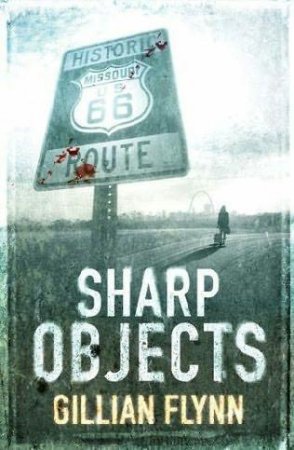 Sharp Objects
Sharp Objects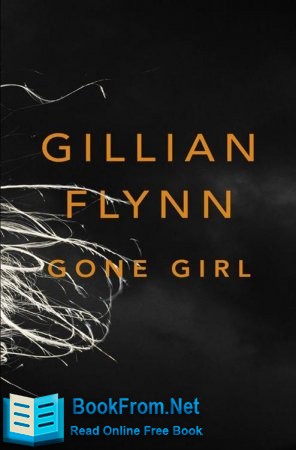 Gone Girl
Gone Girl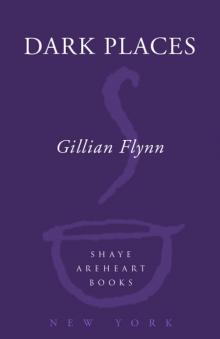 Dark Places
Dark Places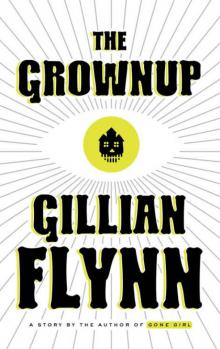 The Grownup
The Grownup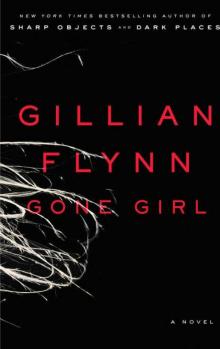 Gone Girl: A Novel
Gone Girl: A Novel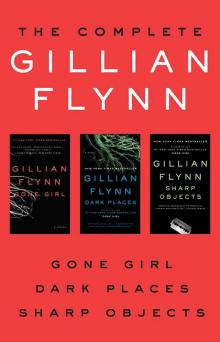 The Complete Gillian Flynn
The Complete Gillian Flynn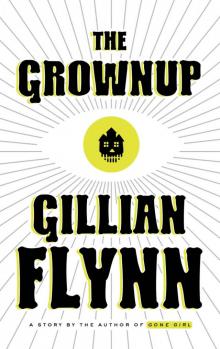 The Grownup: A Story by the Author of Gone Girl (Kindle Single)
The Grownup: A Story by the Author of Gone Girl (Kindle Single)